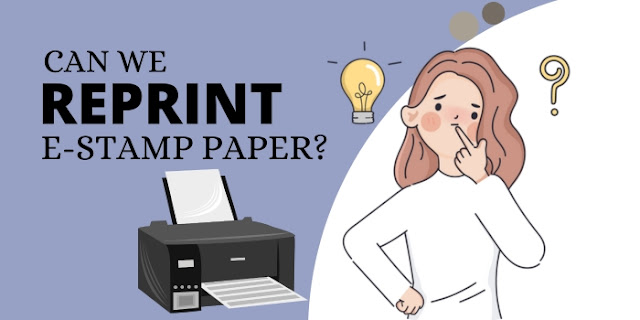Can We Reprint E-Stamp Paper?

In today's digital age, e-stamp papers have become a convenient alternative to traditional stamp papers for executing various legal and financial transactions. However, questions often arise regarding reprinting e-stamp papers. Is it possible? What are the legal implications? Let's delve into the matter to understand the processes and regulations surrounding e-stamp paper reprinting.
Understanding E-Stamp Papers:
E-stamp papers are essentially digital counterparts of traditional stamp papers. They are generated electronically and are used for various legal and financial purposes, including property transactions, agreements, affidavits, and more. E-stamp papers are considered valid legal documents and are governed by specific regulations in each jurisdiction.
Legal Validity of E-Stamp Papers:
E-stamp papers are legally valid documents, provided they comply with the regulations outlined by the respective government authorities. These regulations often include requirements related to authentication, digital signatures, and security features to prevent tampering or forgery.
Can E-Stamp Papers be Reprinted?
While the concept of reprinting traditional stamp papers may not apply in the digital realm, the question of whether e-stamp papers can be reprinted does arise. In most cases, the answer is no. Once an e-stamp paper is generated and utilized for a transaction, it is generally considered non-reprintable to prevent duplication and fraud.
Legal Implications of Reprinting E-Stamp Papers:
Attempting to reprint an e-stamp paper without proper authorization can have serious legal consequences. It may be viewed as an attempt to manipulate or forge a legal document, leading to penalties, fines, and even legal action. Therefore, it is crucial to adhere to the established procedures and regulations when dealing with e-stamp papers.
Procedures for Obtaining Duplicate E-Stamp Papers:
In situations where an original e-stamp paper is lost, damaged, or rendered unusable due to technical issues, there are procedures in place to obtain duplicate copies. These procedures typically involve filing an application with the appropriate authorities, providing necessary documentation, and paying requisite fees. However, obtaining a duplicate e-stamp paper is subject to approval and verification by the authorities.
Steps to Prevent the Need for Reprinting:
To avoid the need for reprinting e-stamp papers, it is essential to take precautions during the initial generation and execution of the document. This includes ensuring the accuracy of information, securely storing digital copies, and implementing robust authentication measures to prevent unauthorized access or alteration.
Conclusion:
While e-stamp papers offer convenience and efficiency in legal transactions, reprinting them is generally not permissible due to the risk of fraud and manipulation. It is essential to understand the legalities and procedures surrounding e-stamp papers to ensure compliance and integrity in all dealings. By adhering to established regulations and implementing appropriate safeguards, individuals and organizations can mitigate risks and uphold the validity of e-stamp papers in the digital age.
Written by Minakshi Tiwari

